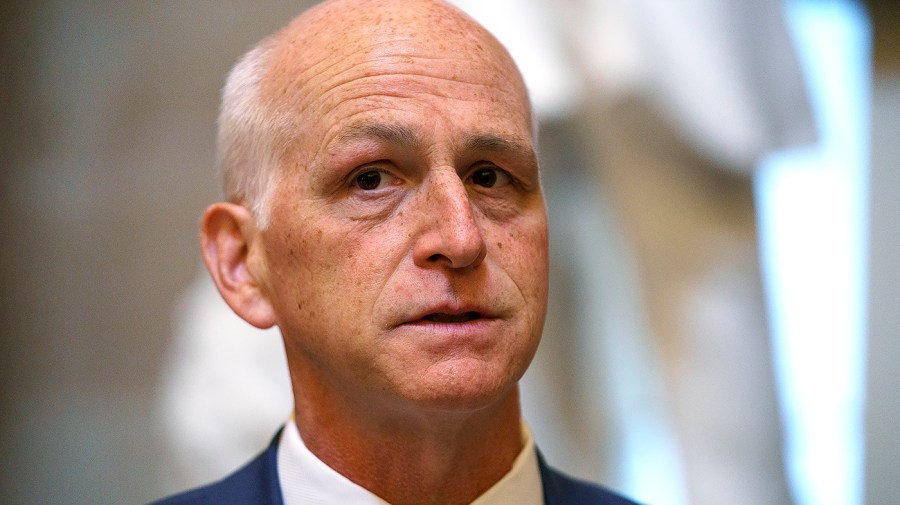GOP battles with itself over possibility of defense cuts
House Republicans are battling over reductions to defense spending, with some in the GOP downplaying the potential for Pentagon cuts and Democrats warning a small group of conservatives could lead to big budgetary cuts.
Speaker Kevin McCarthy (R-Calif.) as part of concessions to Republicans opposed to his Speakership agreed to put a limit on new discretionary spending. The limit would cap all discretionary spending at fiscal 2022 levels, if agreed to as part of a House budget.
The 2022 defense budget was $780 billion, compared to the $850 billion budget for fiscal 2023.
As a result, such an agreement could cut $70 billion for defense spending based on those figures.
Rep. Adam Smith (D-Wash.), the chairman of the House Armed Services Committee in the previous Congress, said the cuts were a real possibility given the narrow GOP majority and the power of a small band of conservatives.

Rep. Adam Smith (D-Wash.) speaks with reporters to discuss the National Defense Authorization bill on Friday, Sept. 30, 2022.
“What we saw in the Speaker fight was that a relatively small number of Republicans are willing to hold the process hostage out of the desire to make dramatic cuts in the budget,” Smith told The Hill. “So regardless of what McCarthy did or did not promise, that same group of people can do the same thing on the budget, on the appropriations bills, on the defense bill.”
Fears that the defense budget could be cut were the stated reason Rep. Tony Gonzales (R-Texas) gave for voting “no” on the House rules package on Monday evening.
Gonzales had warned of his potential vote during an interview Sunday with CBS’s Margaret Brennan in which he said the potential defense cuts were a “horrible idea.”
“When you have aggressive Russia and Ukraine, you’ve got a growing threat of China in the Pacific, how am I going to look at our allies in the eye and say, ‘I need you to increase your defense budget, but yet America is going to decrease ours?’” he said.
Gonzales was the sole GOP vote against the House rules package that passed along party lines on Monday.
It’s possible there will be no cuts to defense after the Pentagon has seen its budget rise steadily in recent years.
A majority of House Republicans are not likely to back any significant cuts to the defense budget, which has typically been the recipient of broad bipartisan support.
And a spokesperson for Rep. Chip Roy (R-Texas), who was among the McCarthy holdouts last week, called claims of cutting defense spending “garbage.”

Rep. Chip Roy (R-Texas) talks to a reporter before a closed-door House Republican conference meeting on Tuesday, January 10, 2023.
The spokesperson also pointed to a Twitter thread from Roy’s press office that discounted the idea of defense cuts.
In that thread, Roy’s press office said the discretionary cap would mean cutting $135 billion from fiscal 2023 levels overall and not from defense. The thread said the cuts could mostly come from federal agencies, and Roy’s office said defense spending cuts were never mentioned during private talks.
“In fact, there was broad agreement spending cuts should focus on NON-DEFENSE discretionary spending,” the thread reads. “This means cutting funding for the woke & weaponized bureaucrats that received massive increases under the $1.7 trillion omnibus.”
However, the White House and Democrats in the House and Senate would be opposed to just cutting domestic discretionary spending alone.
That could lead to cuts to defense and nondefense spending, or no cuts. Or it could lead to an intense fight and a government shutdown.
The Defense Department declined to comment on this story.
Some lawmakers in both parties have raised questions about they skyrocketing Pentagon budget, while other Republican and Democratic Party voices have offered support for more defense spending.
Ukraine is expecting a long war with Russia, while Taiwan is under an increased threat from China. The Pentagon has also said it needs to keep growing to counter the rise of the Chinese military, which is on pace to quadruple its nuclear arsenal in the next 13 years.
White House national security adviser Jake Sullivan expressed little concern for the foreseeable future in terms of funding for Ukraine, noting the $45 billion for Ukraine that was included in the $1.7 trillion omnibus funding bill last year.
“I do not see that money getting taken away from us,” he said at a press gaggle on Monday. “It is there. It is rock solid through nearly all or all of 2023.”
The National Defense Authorization Act passed last year also includes $10 billion for Taiwan spread out over five years.
Clashes over the defense budget likely foreshadows a longer battle on defense spending over the next two years.
Before the GOP narrowly took over the House in November’s midterm elections, McCarthy had promised there would be no “blank check” for Ukraine.
Far-right Republican lawmakers have also decried the billions of dollars in U.S. security assistance flowing to Ukraine without a proper audit of where the money is going.
Some Republicans have signaled there could be cuts in the Defense Department that relate to “woke” practices, a growing cry from the GOP over what they say are extreme progressive policies in the military.
Rep. Jim Jordan (R-Ohio) told Fox on Sunday that “everything has to be on the table” for budget cuts.
“Maybe focus on getting rid of all the woke policies in our military,” the lawmaker said.
House Majority Whip Tom Emmer (R-Minn.), also said on “Fox & Friends” that any cuts would not impact the Defense Department except for what he called “waste.”
“Republicans will not impact defense spending aside from efficiencies and waste,” Emmer said on Monday. “It’s the domestic spending we’re going to go after.”
Smith said the House Armed Services Committee is united behind maintaining defense spending and would continue to do its work this year. The Democrat explained he was mostly concerned about Republican detractors shutting down the government over budget talks.
“It’s really the chaos factor, driven by the small number of Republicans who think the federal government is irrelevant,” he said. “What 80 to 90 percent of the conference wants may not be enough to overcome the chaos.”
Copyright 2023 Nexstar Media Inc. All rights reserved. This material may not be published, broadcast, rewritten, or redistributed.

